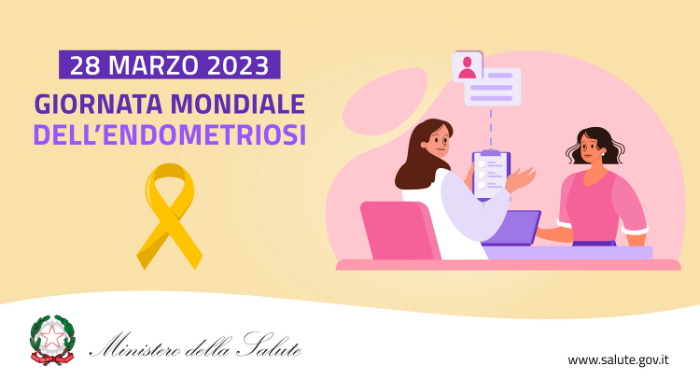March 28, 2023 is World Endometriosis Day, established in 2014 to draw attention to a disease, which, in some cases, can be highly disabling for women who suffer from it.
What do we know
In the world I am about 190 million women and adolescent girls (between 2 and 10% of the general female population) affected by endometriosis during their reproductive years, although some may suffer from it beyond menopause.
In Italy 10-15% of women of reproductive age are affected by endometriosis; the pathology affects about 30-50% of infertile women or with difficulty in conceiving. Women with full-blown diagnosis are at least 3 million.
The peak occurs between 25 and 35 years old, but the pathology can also appear in younger age groups. The diagnosis often comes after a long and expensive journey, most often lived with serious psychological repercussions for the woman.
Endometriosis is characterized by the presence and proliferation of endometrial tissue outside the uterine cavity. Endometriotic tissue is estrogen-dependent and undergoes acute and chronic inflammatory processes, which can involve multiple organs, not just the pelvic organs. Hormone dependence justifies the regression of the endometriotic disease with menopause or in states of amenorrhea.
Depending on the site, endometriosis can lead to:
-
Ovarian injuries
-
Superficial peritoneal lesions
-
Deep peritoneal lesions
In many cases the types of lesions can coexist, however this subdivision is useful for diagnostic and therapeutic orientation.
Endometriosis is frequently associated with infertility and can frequently be the main cause. Within the different working groups, which deal with endometriosis from a surgical, clinical, biological and fertility point of view, there is still no full agreement on the classification systems and on how to evaluate the role of endometriosis on fertility and the consideration that must be taken in planning a surgical or medical or medically assisted procreation (MAP) treatment.
Impact of endometriosis
Endometriosis can have a significant impact on the quality of life, both for the symptomatological aspect (menstrual pain, chronic pelvic pain, pain during sexual intercourse, difficulty or pain on urination, difficulty or pain on defecation), and for the potential negative impact on fertility. While it has been shown that endometriosis symptoms, especially pain, can have a huge impact on quality of life, physical functioning, daily activities, social life, mental health and emotional well-being, this condition remains under -diagnosed and can go unnoticed for many years.
If painful menstruation prevents you from following the routine everyday life, going to work or school, do not hesitate to contact your doctor or specialistable to direct towards the tests necessary to reach an accurate diagnosis and start the appropriate treatments.
Endometriosis is included in the LEA (Essential levels of assistance) in the list of chronic and disabling pathologies, with recognition of the right to exemption from co-payment for some specialist services (moderate and severe endometriosis).
Treatment
Being a chronic and progressive condition, endometriosis requires prolonged management and it is therefore important to consider in its choice the characteristics and needs of each individual patient, the long-term tolerability and safety profile, as well as its clinical efficacy.
The age of the woman and her fertility potential should also be taken into consideration when selecting treatment. In the absence of studies identifying the best treatment, it is important that the woman is involved in any treatment plan and is able to make an informed choice.
Guidelines on endometriosis and recent scientific evidence
In 2022 the European Society for Human Reproduction and Embryology (ESHRE) updated the guidelines on the diagnosis and treatment of endometriosis published in 2014.
Recent scientific evidence reveals that diagnostic laparoscopy is no longer the gold standard diagnostic and is now only recommended in patients with results of imaging negative and in which treatment was unsuccessful or inadequate. Furthermore, the development of new non-invasive methods and the improvement of existing ones to reliably detect or exclude endometriosis are of paramount importance.
One study published in the scientific journal Breastfeeding Medicineconducted by a team of researchers from Iran and Australia, led to a review and meta-analysis of the medical literature, with the aim of evaluating the effect of breastfeeding and breast milk ingestion on the risk of endometriosis. The results of the study, which involved approximately 11,000 women, showed that breastfeeding it is associated with a significant reduction in the probability of developing the disease.
Endometriosis research calls
In order to evaluate the incidence of endometriosis and analyze its pathogenesis mechanisms, a research call was launched in 2021 aimed at all researchers of the National Health Service and the decree of 22 March 2021 was signed, authorizing the expenditure of 3 million euros broken down over the financial years 2021-2022-2023.
Of the thirty projects resulting in the final ranking, nine projects were found to be in a useful position for the purposes of ministerial funding and the first tranches in advance were disbursed for a total of 1 million euro. The resources were divided on a percentage basis with respect to the final score and the budget required. The institutional recipients of the nine projects subject to the first funding are:
-
IRCCS San Martino Polyclinic Hospital
-
IRCCS Burlo Garofolo
-
Emilia Romagna region
-
Lombardy Region (2 projects)
-
Tuscany region
-
Major Hospital
-
IRCCS San Raffaele Hospital
-
IRCCS Sant’Orsola Polyclinic.
In addition to the projects financed with the 3 million euros for the Endometriosis tender, as part of the 2018 and 2019 editions of the Finalized Research, 3 research projects were financed for a total of almost 950.000 euro.
Green number SIGO 800.592.782
On the day dedicated to endometriosis, SIGO confirms its commitment to women affected by this pathology, making the toll-free number 800.592.782with which women will be able to represent their doubts, ask for information, both diagnostic and therapeutic, quickly receiving answers from expert gynecologists of the disease.
To know more
